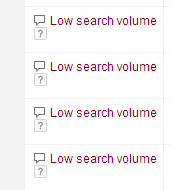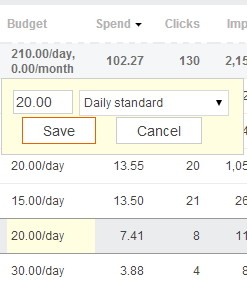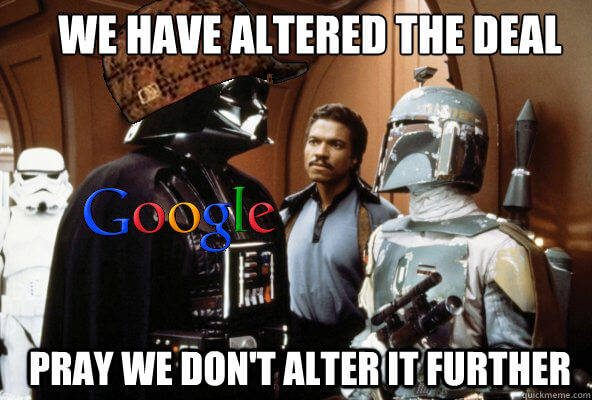Prepare Your PPC Plans For The Search Engines’ Inevitable Pivots
Last week, Google announced some panic-inducing security enhancements, essentially removing search queries in referring URLs for PPC clicks. Plenty has already been written about this topic and, without getting into it too much, I think it’s a bit of a storm in a teacup. Larry Kim summed it up well last Thursday: It’s pretty much […]
Last week, Google announced some panic-inducing security enhancements, essentially removing search queries in referring URLs for PPC clicks. Plenty has already been written about this topic and, without getting into it too much, I think it’s a bit of a storm in a teacup. Larry Kim summed it up well last Thursday:
It’s pretty much a non-issue for most of the people who actually do paid search work. But you wouldn’t know it based on the all the hysteria.
 However, before we knew the scope of Google’s planned changes, the team at Hanapin sat down to prepare an action plan for adapting to (not provided) in our accounts.
However, before we knew the scope of Google’s planned changes, the team at Hanapin sat down to prepare an action plan for adapting to (not provided) in our accounts.
The point to our exercise was more than just coming up with the most interesting “what if” scenario. We needed to understand if we, as an agency, have a good system in place to pivot when Google “alters the deal” — which it is known to do with some regularity. In this case, we aren’t really going to end up losing much, but it’s still very much a possibility for the future.
Let me take you through our thought process in this case, which we think provides a good framework for preparing for any kind of dramatic search engine change.
Account Structure
We began by analyzing the effect the change might have on account structure. Our conclusion: Rest in peace, broad match!
The consensus was that any well-run account would become heavily reliant on exact match in this scenario. Some accounts would start to look ridiculous. For the past three months, one of my accounts has had 400,000 unique search queries generate clicks. Trying to retain that level of coverage in an exact-only model would be tricky, although not impossible. Given that the account has 1.7 million keywords in it already, it wouldn’t be a stretch to say it could be done.
One concern was how Google would treat “Low Search Volume” keywords in an exact-only model. No longer would a modified broad suffice to sweep up the long-tail, low volume queries.

Could really use more of this in my accounts!
Our imagined implementation of “(Not provided)” would have put an end to the alpha-beta style of account structure. This is where one campaign (beta) is filled with broad and modified-broad terms and then mined for converting search queries as data starts flowing. You then take these converting queries and put them into your alpha campaign as exact match, single keyword, ad groups.
It’s quite a successful way to operate that we use in a lot of our accounts. However, no search queries would mean there would be no way to set up the beta campaigns any more.
Given this, we began to think about making a big switch in account structure to focus on search funnels, especially in smaller accounts where it’s not worth the time to build out half a million exact-match terms. Ideal campaign structure would be more along the lines of:
- Campaign A: Top of funnel – research keywords
- Campaign B: Middle of funnel – why this product in particular?
- Campaign C: Bottom of funnel – brand traffic / “buy now” searchers
This is something we do with some of our accounts right now, but other structure types (such as alpha-beta) can prove more effective. Combine this with a higher reliance on Analytics data (which broad-match keywords are driving engagement?) and we could still have some really successful campaigns.
Less Optimization
Another scenario we pondered was that people don’t switch to using exact-only, as traffic volume is too important; they can’t afford to cut a vast swathe out of their click profile by removing modified broad-matches. That means one of two things – higher CPAs or lower bids. One is bad for advertisers; the other is bad for Google.
A number of other reports would also be totally worthless, such as close variant analysis (back to having misspellings we go — boo!) and cross-pollination (queries showing for multiple keywords).
Search Partners
One of my previous posts covered how to go about optimizing search-partner traffic. Without search query data, this would have become almost impossible.
Right now, the only option we have for improving search-partner traffic comes from the search term report and applying relevant negatives. If we had to do without it, we’d be forced back to an all or nothing strategy that will result in a lot of advertisers just turning them off – something Google really doesn’t want.

An example of a search partner query
Negative Research Would Become A Big Deal
Right now, negative keywords tend to be added to the account in two ways. An initial brainstorm and then an ongoing trawl of the search-term data.
However, without search queries, we’d have had to shake this up. First, the initial negative-keyword additions would become a much bigger project to which we’d need to devote a lot more time. No more cutting corners and waiting for the data.
Second, any new negatives we thought would help CPAs would have had to be tested. I can envisage creating test negative keyword lists that get added to campaigns and then judged on a before-and-after basis. Much messier and less scientific.
Big Wins For Bing
The guys over at Bing must have been licking their lips at the prospect of Google ever removing search queries. It’s a simple fact that budget-limited advertisers will spend where the returns are best. If Bing lets them optimize down to the search query, chances are they’re going to have better CPAs.

Yo ho, and up she rises!
Tools
We couldn’t decide if our imagined “(not provided)” scenario would be a boon to automated tools or not. On the one hand, the need for extracting search queries (both positive and negative) would be lost.
On the other, there would be a spike in demand for help building out huge and cumbersome exact-match-only accounts. We also wondered if Google would retain search query data for themselves or if it would never be recorded in the first place. In the former instance, I imagine the Conversion Optimizer would pull ahead of other bid automation platforms.
Impact?
Given the power that inertia holds over most advertisers, “(not provided)” probably wouldn’t have been that bad a move for Google. Sure, they would have had to weather a storm of complaints, but they already proved they can handle it with Enhanced Campaigns (Who’s even talking about those any more?)
Most people would keep doing what they’re doing, but maybe with less optimization. The good publicity and public goodwill that increased-user-privacy would generate for Google would be worth it to them over the long-term.
Heck, an all-encompassing “(not provided)” situation might have forced us to be smarter, just like Enhanced Campaigns forced us to take mobile and tablet web design more seriously.
We’d have had to invest far more effort into retention, conversion rates and nursing our funnel. This development would be a good thing for PPC Pros. Rather than generating complaints, such a chance should engender rejoicing! Great PPC would go back to fundamentals and be less data-obsessed.
I don’t know about you, but I wouldn’t be totally against spending my time writing great ad copy and creating exceptional user experiences over digging through data.
Contingency Planning For The Future

Courtesy of user plsearch on warrior forum
Though our all-encompassing “(not provided)” scenario didn’t come to pass, going through the thought experiment we did was still helpful to us as a company.
The last time something like this happened was with per-device campaigns when Enhanced Campaigns came along. Our agency policy up until that point had been to always triple up campaigns into mobile, tablet and desktop. Luckily (or unluckily depending on if you’re a glass half-full or half-empty person) Google gave us a few months to get our accounts in order before pulling this rug from under us.
However, it meant a great deal of work and lost optimization (all our carefully researched bids and targets were thrown out, as was our tablet-specific ad copy). I saw examples from other agencies in which mobile wasn’t just in another campaign but completely different mobile-specific account — that must have taken some adjustment.
What we learned is that we needed to start having plans in place to deal with the potential problems of another such thing happening.
What did we come up with for “(not provided)”?
- We should tweak the way we do alpha/beta campaigns to include more exact-match from the start. Instead of exact/broad campaigns we are going to have “top-performing, exact keywords in single-keyword ad groups” / “all other keywords we can think to build out from the start in modified broad and exact.” I’m not too worried about the super long-tail stuff as it’s such a minor percentage of my traffic in the first place.
- Being great at the technical side of accounts is a huge plus, but being great at marketing will always win out. We should start to focus more on the core components of our business like writing great ad copy and helping clients make appealing landing pages. If we can do these two things well, then other changes won’t hit us as hard.
Of course, such exercises are always a work in progress, but big changes are something we are now much more actively thinking about and planning for. The worst thing you can be in the modern world is slow to adapt. Remember, it’s not the strongest that survive, but the most adaptable to change.
What’s your most dramatic what-if scenario? How are you planning to deal with it? Let us know in the comments below!
Contributing authors are invited to create content for Search Engine Land and are chosen for their expertise and contribution to the search community. Our contributors work under the oversight of the editorial staff and contributions are checked for quality and relevance to our readers. The opinions they express are their own.
Related stories